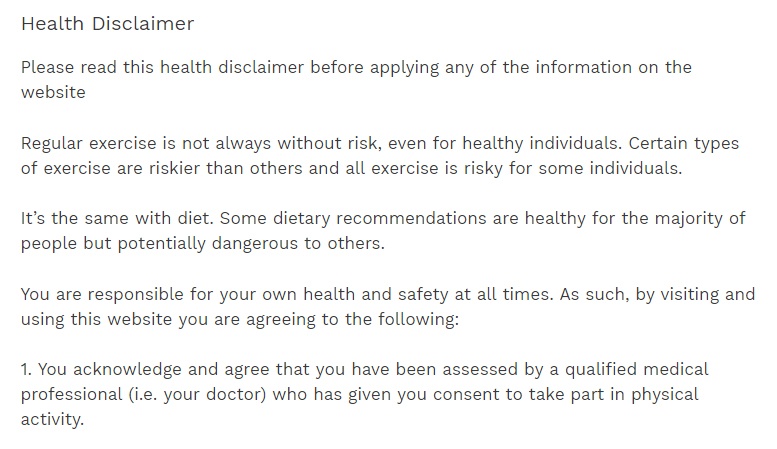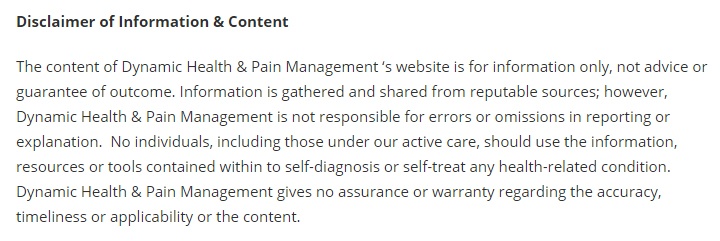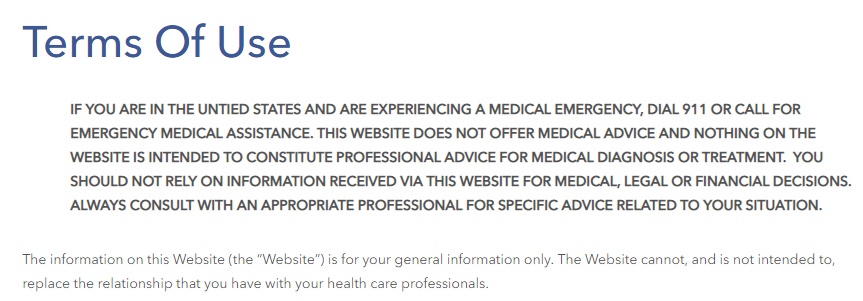Medical Disclaimers
Contrary to what you might think, medical disclaimers don't apply to doctors and nurses. In fact, it's the exact opposite. A medical disclaimer is a written statement made by a person, company or website that says they're not responsible for what may happen to you if you use their information in place of official advice from a medical professional.
In other words, a medical disclaimer stresses that the information given in a blog post, email, video, slideshow, sales presentation, customer testimonial, etc. doesn't replace a trip to the doctor.
You may want to use the information as a supplement to better understand your diagnosis or treatment, but it shouldn't be the sole thing that you use to make important medical decisions.
Don't confuse Medical Disclaimers with Health Disclaimers
While the two are similar, you need to know the difference if you plan on publishing health-related or medical-related information.
Typically, medical disclaimers are used when the information presented could be mistaken for free medical advice. For example, when you log onto WebMD's Symptom Checker, you'll see this disclaimer at the bottom:
"This tool does not provide medical advice It is intended for informational purposes only. It is not a substitute for professional medical advice, diagnosis or treatment. Never ignore professional medical advice in seeking treatment because of something you have read on the WebMD Site. If you think you may have a medical emergency, immediately call your doctor or dial 911."
While WebMD has technology that allows you to type in your symptoms and get a list of diseases or conditions that could be causing them, you shouldn't opt for the Symptom Checker over an actual appointment with your doctor.
If there's still a risk to your health, but the information itself doesn't bear any resemblance to a doctor's advice, you would use a health disclaimer instead. For example, look at the disclaimer that Sport Fitness Advisor, a website that provides tips for people who want to lose weight and gain muscle, uses:

There are other things that Sports Fitness Advisor says that you're agreeing to, but #1 is the most important for our discussion. This disclaimer looks totally different from WebMD's disclaimer. Plus, it says that you need a doctor's "consent to take part in physical activity."
Because the information on this website doesn't look like free medical advice, it's a health disclaimer instead of a medical disclaimer.
Even if you're reading something that YOUR doctor published, there will still likely be a medical disclaimer attached to it.
For example, look at the disclaimer that Dynamic Health & Pain Management uses:

Where are you likely to find Medical Disclaimers?
- On websites that belong to big medical entities
Visit the American Medical Association's (AMA) website and you'll find this disclaimer in its Terms of Use:

It's only one sentence, but it tells you everything that you need to know. Yes, there's plenty of information on the AMA's website, but none of it should be considered free medical advice or replace a doctor's appointment.
- On websites that belong to pharmaceutical companies
Pfizer is one of the biggest pharmaceutical companies in the world. As you can imagine, its website gets a lot of traffic. Every visitor who visits Pfizer's Terms of Use page will see this medical disclaimer:

Pfizer's website contains a lot of patient testimonials, articles about some of the company's future plans, and articles that explain how the company creates drugs to attack illnesses in a very specific way. There's a ton of information on this website, which is why it's so important for the company to have a medical disclaimer in place. Otherwise, it could be legally liable if someone reads one of the articles and decides to try and treat his illness without any input from a doctor.
- On websites that belong to hospitals
While there are certainly plenty of medical professionals at a hospital, that doesn't mean you can use the hospital's website as a substitute for one-on-one treatment and advice.
For example, Tampa General Medical Group has a medical disclaimer on its website that covers a variety of liability issues:

First and foremost, they tell you to call 911 for any medical emergencies. This may seem unnecessaryto mention because it's plain ol' common sense, but it's obvious that they would rather be safe than sorry.
Next, they explain that the content on their website is for informational purposes only. Not only that, but they "assume no responsibility for how You use the information." That covers two big liability issues.
- On websites that belong to medical schools
Among other things, the University of Miami's medical school website provides research findings and articles about studies that the school is currently working on. As a result, the school has created an entire page for a conspicuous medical disclaimer:

While the school's research is certainly interesting, it doesn't want you to take its findings and use them to make important medical decisions. In fact, the school even encourages you to "confirm the information herein with other sources." It's made clear that this information is something that you may want to talk to your doctor about when the conversation focuses on your individual medical care.
- On personal blogs that talk about medical conditions
PatientsLikeMe is a website where the patients themselves go to share information about their diagnoses and treatments. The goal is to have people sharing what has worked for them in hopes that it can help someone else.
But since there is so much information floating around and so many posters who aren't officially affiliated with the website, there's a very specific disclaimer on the Terms and Conditions of Use page:

Posters on PatientsLikeMe share all kinds of sensitive medical information, but the owners of the website want to make sure that you don't mistake those comprehensive details for actual medical advice. In fact, they come right out and say, "Never disregard professional medical advice or delay in seeking it because of something you read on this Site."
- On alternative medicine blogs
GreenMedInfo is one of the most popular alternative medicine blogs on the web. The site features everything from news developments and guides about therapeutic substances to articles that summarize the latest alternative medicine research and abstracts from official government studies. Because the website's information is so comprehensive, it has a medical disclaimer at the bottom of every page on the site:

As much as the owners of this website believe in the power of natural and alternative medicine, they do tell their visitors to get advice from "a licensed healthcare professional."
- On herbalist blogs
Over on Botaniscape, herbalist Loretta Boyer McClellan calls her website "Nature's Answer for Nurture." McClellan shares ways to combine herbs, discusses the benefits of specific herbs and recommends specific herbalism schools and educators.
She also has a conspicuous medical disclaimer on every page of her website:

McClellan makes three things clear -- she is not a doctor, her information has not been evaluated by the Food and Drug Administration, and readers need to speak to their doctors before using any kind of herbal product.
The final sentence of her medical disclaimer is probably the most impactful when it comes to limiting legal liability. She writes, "Any application of the material provided is at the reader's discretion and is his or her sole responsibility."
In other words, what you do with her information is up to you, and she's not responsible for what may happen as a result.
- On websites that sell medical devices
Applied Medical is a company that designs, develops, and manufactures surgical tools that are used in minimally invasive procedures. While they certainly know a lot about modern medicine, the company also includes a very specific medical disclaimer in its Legal Notice:

There are a few important statements in this disclaimer. For starters, they come right out and say that "APPLIED MEDICAL DOES NOT PROVIDE MEDICAL ADVICE." Without this disclaimer -- and considering what the name of the company is and what it does -- you might be inclined to think that they have the credentials to offer you medical advice. This sentence in the disclaimer makes it clear that they don't.
After telling you that their content is strictly for "informational purposes," they make another important statement -- "Reliance on any information provided on the Sites is solely at your own risk." In other words, they've told you that their information doesn't come from doctors, but if you choose to use it that way, they're not responsible for what happens.
This type of disclaimer is one of the most common you'll see.
In most cases, medical disclaimers will come with some kind of mention that if you use the information provided, you're doing so at your own risk.
However, simply saying "use at your own risk" isn't always enough to keep you out of court. No matter how clear your medical disclaimer is, it only applies to foreseeable risks. Like the name implies, a foreseeable risk is one that you knew was a distinct possibility.
For example, you know that if you ride in a car there's a chance you could get into some kind of accident. But if one of the car's axles wasn't made properly and snaps off causing you to go careening into oncoming traffic, that's not a foreseeable risk. No reasonable person could have predicted that. As a result, a court would likely rule that the car's manufacturer was legally liable, even if their contract said you were using the car at your own risk.
Another common phrase in medical disclaimers is "not responsible for errors or omissions." That's because no one is perfect. Any website can fall victim to typos and other errors. Plus, in an ever-changing field like medicine, there are always new studies and new findings to talk about. Even with a big staff, it's hard to maintain content that's got up-to-the-minute information. As a result, you might read an article that doesn't mention the groundbreaking research that was announced two days ago.
Medical disclaimers come in a variety of shapes and sizes, and because of the effect that they can have on readers, they're one of the most important things you can publish. That may seem like a lot of pressure, but now you know how they work, what they look like and how they should be used. That means you're ready to craft a proper medical disclaimer of your own.